Law
HURIPECTalks: A Podcast by HURIPEC
Published
2 years agoon
By
Zaam Ssali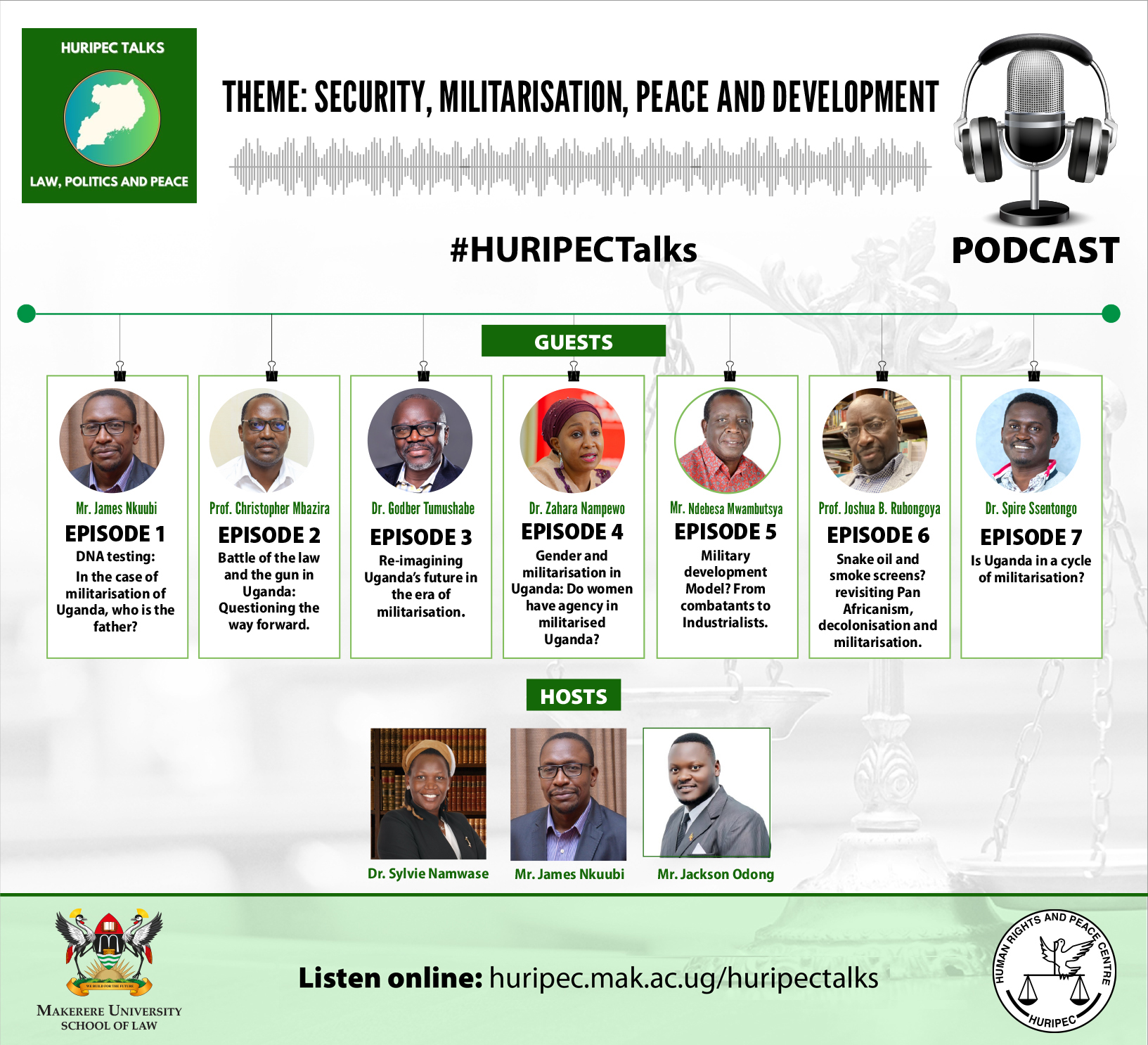
To listen: huripec.mak.ac.ug/huripectalks
#HURIPECTalks is a podcast hosted by HURIPEC. It explores various issues shaping Uganda today and offers a platform where academics at the School of Law and beyond can share their research and reflections on a multitude of topics. The main objective of the podcast is to broaden avenues for dialogue, knowledge production and knowledge exchange with a view towards solving some of the most pertinent challenges facing Uganda, Africa and the world. The podcast is anchored in analyses on human rights, sustainable development, conflict resolution, gender equality, constitutional law, social justice, among others.
This first HURIPECTalks podcast series on law, militarisation, peace and development defines militarism and militarisation and explores how these phenomena have manifested throughout Uganda’s history and present. It examines how militarism and militarisation are impacting rule of law, policy and politics as well as the economy and society, and how they are shaping gender relations, youth expressions and aspirations. The series also unpacks theories of Pan Africanism and decolonisation in relation to militarisation and militarism, and how they influence peace in Uganda and in the broader African context. The different episodes in this series suggest ways in which Uganda can balance the role of the military in operations other than war, such as development and security roles, while preserving democratic agendas and aspirations towards inclusivity, balanced civil military relations and sustainable peace in Uganda
| Episode | Title and description of episode | Guest/Host |
| Introduction This is an introduction to the podcast series: HURIPECTALKS. It is made by the Director of HURIPEC and in it, he briefly describes HURIPEC’s history and mandate and how HURIPECTALKS serves as one of many platforms for the institution’s academic research, dissemination and advocacy mandate. | Director, HURIPEC Dr. Kabumba Busingye | |
| Episode 1: | DNA testing: In the case of militarisation of Uganda, who is the father? The return of coups d’états in West Africa, has once again pushed militarism to the forefront of Africa’s politics, and here in Uganda, the discourse around the role of armies in the country’s social, political and economic landscape is gaining momentum. But as you discover in this episode, militarism is not new to our collective memory as a country. To start off this series, we ask ourselves where this phenomenon of militarism and militarisation came from and how it has come to define who we are as Ugandans. This episode explores the following key areas: the History of militarisation in Uganda; the conceptual scope of militarism and militarisation; contemporary manifestations of militarisation in Uganda; and a contextual understanding of militarisation in Uganda. It asks a critical question whether Uganda is a country with a military or a military with a country. It leaves this question unanswered to set an open dialogue for the rest of the series and for broader reflection by listeners. Reference material: Jude, Kagoro. Militarisation in post 1986 Uganda: Politics, Military and Society Interpretation. 2015. Wæver, Ole. “Securitization and Desecuritization.” In On Security. Edited by Ronnie Lipschutz, 46–86. 1995. | Guest: Mr. James Nkuubi Host: Dr. Sylvie Namwase |
| Episode 2: | Battle of the law and the gun in Uganda: questioning the way forward This episode unpacks the tensions between law and militarisation in Uganda. It explores the impact of military deployment in Uganda’s development sectors in the absence of functional institutional and civilian oversight. It also examines the phenomenon of “orders from above” and the impact this has on governance. Ultimately, the episode examines the relationship between the supremacy of the military versus the supremacy of the 1995 Constitution of the Republic of Uganda. Reference material: Uganda v. Commissioner of Prisons, Ex Parte Michael Matovu [1966] 1 East Africa Law Reports 514. | Guest: Prof. Christopher Mbazira Host: Mr. James Nkuubi |
| Episode 3: | Re-imagining Uganda’s future in the era of militarisation. This episode explores how militarization and militarism are impacting citizens’ agency and accountability of state institutions in Uganda. The episode examines how these phenomena affect the various formations of citizens’ civic expression in Uganda, such as youth, ethnic nationalities, media, civil service, and many others. It also considers the question whether beyond militarisation the army has a role to play in civic spaces. Reference material: Rebecca, Tapscott. Arbitrary states: social control and modern authoritarianism in Museveni’s Uganda. 2021. | Guest: Dr. Godber Tumushabe Host: Dr. Sylvie Namwase. |
| Episode 4: | Gender and militarisation in Uganda: Do women have agency in militarised Uganda? This episode examines how militarization and militarism impact gender dynamics in Uganda. It explores the roles women played in Uganda’s military and political history and interrogates whether these roles have translated into benefits for Ugandan women in today’s socio-economic and political context. The episode also explores how militarism and militarisation affect masculinities in Uganda. Reference material: The Abuja Declaration on HIV/AIDS, Tuberculosis and other related infectious diseases. 2001.Sylvia, Tamale. Decolonisation and Afro-Feminism, 2020.Rosalind, E. Boyd. ‘Empowerment of women in Uganda: real or symbolic,’ Review of African Political Economy, 16:45-46, 106-117(1989). | Guest: Dr. Zahara Nampewo Host: Dr. Sylvie Namwase |
| Episode 5: | Military development Model? From combatants to Industrialists. This episode examines the role of the military in the industrialization process underway in Uganda. It takes a specific focus on the National Enterprise Corporation (NEC) which is the commercial arm of the Ministry of Defence and the Uganda Peoples’ Defence Forces (UPDF). It also explores the role of the UPDF in natural resource protection with respect to forestry, fisheries, minerals and wild life resources. References: National Economic Corporation Act, 1989. Report of the Panel of Experts on the Illegal Exploitation of Natural Resources and Other Forms of Wealth of the Democratic Republic of the Congo (document S/2002/1146). https://www.securitycouncilreport.org/atf/cf/%7B65BFCF9B-6D27-4E9C-8CD3-CF6E4FF96FF9%7D/DRC%20S%202002%201146.pdf | Guest: Mr. Ndebesa Mwabutsya Host: Mr. Jackson Odong |
| Episode 6: | Snake oil and smoke screens? revisiting Pan Africanism, decolonisation and militarisation This episode explores Pan Africanism, decolonisation and militarisation in Uganda with a focus on the political economy of regional militarisation. The episode discusses the role of the Uganda People’s Defence Forces (UPDF) in Africa with regard to peacekeeping and stabilisation missions. It also explores the role of global actors such as the United Nations, the European Union and the African Union and regional blocs such as the East African Community. | Guest: Prof. Joshua B. Rubongoya Host: Mr. Jackson Odong |
| Episode 7: | Is Uganda in a cycle of militarisation? This concluding episode reflects on the entire series and analyses the political, social and economic landscape in the country to ask the critical question whether Uganda is repeating its history of militarism which led it down a path of political, social and economic turmoil. It explores aspects of citizen’s resistance, compromise and/or co-optation to militarisation. It probes what type of citizen has emerged in Uganda over the course of a history marked by militarisation. It concludes with reflections on how Uganda might ensure peace even in the context of militarisation. Reference material: Jimmy Spire Ssentongo. What I saw when I died. 2021.Jimmy Spire Ssentongo. Quarantined: my ordeal in Uganda’s Covid-19 isolation Centres. 2021. Jimmy Spire Ssentongo. Uncomfortable laughter. 2020.Jimmy Spire Ssentongo. Inquiry into withering heritage: the relevance of traditional Baganda approaches to sustainable environmental conservation today. 2012. http://ir.umu.ac.ug/xmlui/handle/20.500.12280/587 | Guest: Dr. Spire Ssentongo Host: Dr. Sylvie Namwase |
About the Guests
Mr. James Nkuubi, practices Constitutional and human rights law and democratization in Africa through teaching, research, writing and strategic activism with particular focus on security sector reform, citizenry resilience and liberative politics in Africa. James also lends a great deal of his professional acumen and time to human rights initiatives and campaigns across Uganda. He has previously chaired the Civil and Political Rights Working Group under the Network for Public Interest Lawyers, based at the School of Law, Makerere University-using public interest litigation to counter, mitigate and combat social injustice, human rights and constitutional law transgressions by the State. James holds a Masters’ Degree in human rights and democratization in Africa from the Centre for Human Rights, University of Pretoria and currently an LLD student focusing on Militarization, peace and sustainable development, under a programme administered jointly at the Department of Political Science, Centre for Resolution of International Conflicts (CRIC), University of Copenhagen-Denmark and the Human Rights and Peace Center, School of Law, Makerere-University, Kampala-Uganda. James has published journal articles and book chapters on the subjects of militarization, electoral security, citizenry resistance to State-led militarism among others.
Dr. Christopher Mbazira is a Professor of Law at the School of Law, Makerere University. He is also the Coordinator of the Public Interest Law Clinic (PILAC) at the same School and a founding member of the Network of Public Interest Lawyers (NETPIL). He previously chaired of the Rule of Law Committee of the Uganda Law Society. He was one of 9 academics who approached the Supreme Court of Uganda and were admitted as amici in the 2016 Presidential Election Petition. This has resulted into positive jurisprudence on the subject of Amicus Curae. Prof. Mbazira has written and spoken widely on the subject of socio-economic rights in the context of the judicial application of these rights as well as public interest litigation. Since 2018, Prof Mbazira has supported the National Planning Authority (NPA) in integrating the Human Rights Based Approach in the country’s development agenda. Prof Mbazira has consulted with international agencies, including the United Nations on human rights and governance matters. In 2021, Prof Mbazira won the Uganda Law Society Award for his distinguished service in legal education in Uganda. Prof Mbazira has been key in introducing the use of the clinical methodology of teaching the law and building a community of public interest lawyers in Uganda. Prof Mbazira holds an LLB from Makerere University, an LLM in Human Rights from the University of Pretoria and a PhD from the University of the Western Cape in South Africa. In 2015, Christopher was a co-recipient of the Vera Chirwa Award given by the Center for Human Rights, University of Pretoria, for his outstanding contribution in the promotion of socio-economic rights in Africa.
Mr. Godber W. Tumushabe is a lawyer, policy analyst, community organizer and social entrepreneur. He teaches international law, international and regional human rights, and environmental law. He is the founding Executive Director of Advocates Coalition for Development and Environment (2000-2013) and is currently Associate Director at the Great Lakes Institute for Strategic Studies (GLISS), a Kampala-based regional think tank. He holds a bachelor’s degree in law (LLB) and a Master of Laws Degree (LLM) from Makerere University, and a Juridical Science Master (JSM) Degree from Stanford Law School, Stanford University. He previously worked with the African Centre for Technology Studies in Kenya (1997-1999) where he directed Africa-wide projects on environmental governance. Godber Tumushabe has published widely on a wide range of domestic and international policy areas. He is co-author of Governing the Environment: Political Change and Natural Resources Management in Eastern and Southern Africa and Unlocking Africa’s Future: Biotechnology and Law.
Dr. Zahara Nampewo is a lawyer and human rights practitioner with over 20 years’ experience in the private, public and non – profit sectors. She has been with the School of Law at Makerere University since 2006. She is the Deputy Principal of the School of Law. Dr. Nampewo received her PhD from Emory University in the United States. Her PhD research focus followed a feminist socio-legal examination of law and culture on how women’s sexuality is articulated within the social domains of family and marriage. She holds a Master of Laws degree (International Human Rights) from the University of Nottingham in the United Kingdom and an advanced Diploma in Human Rights Protection from Abo Akademi University, Turku, Finland. She completed her Bar Course and acquired a Diploma in Legal Practice from the Law Development Centre in Uganda in 1999. She is an Advocate of the Courts of Judicature in Uganda. Dr. Nampewo’s areas of interest and expertise include human rights, health justice, gender and transitional justice. She teaches and practices in Health Law, International Humanitarian Law, Human Rights and Gender Law. Dr. Nampewo has published on a range of subjects including health and disability justice, gender and family law, sexuality, human rights and access to justice.
Mr. Ndebesa Mwambustya is a Political Analyst and former Senior Lecturer of History and Development Studies in the College of Humanities & Social Sciences (CHUSS), Makerere University.
Professor Joshua Rubongoya is anaccomplished liberal arts college Professor (Ph.D. University of Denver) with over 24 years of instructional and administrative expertise. Responsible for lectures, seminars, workshops and student trips to Africa for hands-on experiential learning. Served as Department Chairperson for 3 years in an academic department of 6 full-time and 4 adjunct professors and managed inter alia the Department budget, new faculty recruitment and curricula revisions in addition to liaising with the Academic Dean. Committed to research; authored Regime Hegemony in Museveni’s Uganda: Pax Musevenica, journal and newspaper articles/reviews and book chapters. Experience also includes consultancies for organizations such as the World Bank and Danida in several areas: political economy, democratic governance and party politics in Uganda. Also served as political analyst on Uganda TV including NTV and WBS.
Dr. Jimmy Spire Ssentongo is a Lecturer in the Department of Philosophy, Makerere University, where he has taught since 2011. Jimmy is a member of Makerere University Press Editorial Board, since 2018 and a Coordinator of Ethics in the Department. Previously, he was an Associate Professor of Ethics and Identity Studies at Uganda Martyrs University, where he variously served as Associate Dean of the Faculty of Arts and Social Sciences; Associate Dean in Charge of Research and Publication at the School of Postgraduate Studies and Research; and founding Chair of the Center for African Studies. Jimmy has edited two book volumes and widely published in peer-reviewed journals, book volumes, and monographs. With a strong belief that academics should be actively engaged in their communities, Jimmy has served as a Columnist and Editorial Cartoonist for the Observer Newspaper since 2006. In 2021, he won the national Janzi Award for Outstanding Cartoonist, and also nominated for Outstanding Non-Fiction Writer. He holds a Doctor of Philosophy (PhD) from the University for Humanistic Studies (Holland), and was a winner of the Commonwealth Scholarship for MSc in Education for Sustainability at London South Bank University where he won the Dean’s Award for Best Student on the programme. Most recently, Jimmy won a fellowship on the African Humanities Program (2019-2020) and was also a Visiting Research Fellow at the Centre for African Studies at the University of Cambridge (2019- 2020). He is a facilitator on the Friedrich Ebert Stiftung ‘Youth Leadership Programme’ on ‘Managing Diversity’ since 2017. He was recently appointed to the Board of the Cross-Cultural Foundation of Uganda and also serves as the current Chairman of the Board of Padre Pio Rural Development Initiative (PAPIRUDEI).
You may like
-


Mak 76th Graduation Ceremony: CoNAS Presents 16 PhDs & Best Performing Male Student in the Sciences
-


Medical graduates urged to uphold Ethical values
-


CAES Presents Overall Best Performing Student in the Sciences & a Record 28 PhDs at the 76th Graduation Ceremony
-


Over 9,200 to graduate at Makerere University’s 76th Graduation
-


Philliph Acaye and the Making of Uganda’s Environmental Health Workforce
-


Meet Najjuka Whitney, The Girl Who Missed Law and Found Her Voice
Law
Disclaimer Notice: LLB Pre-Entry Examination
Published
2 months agoon
January 5, 2026By
Mak Editor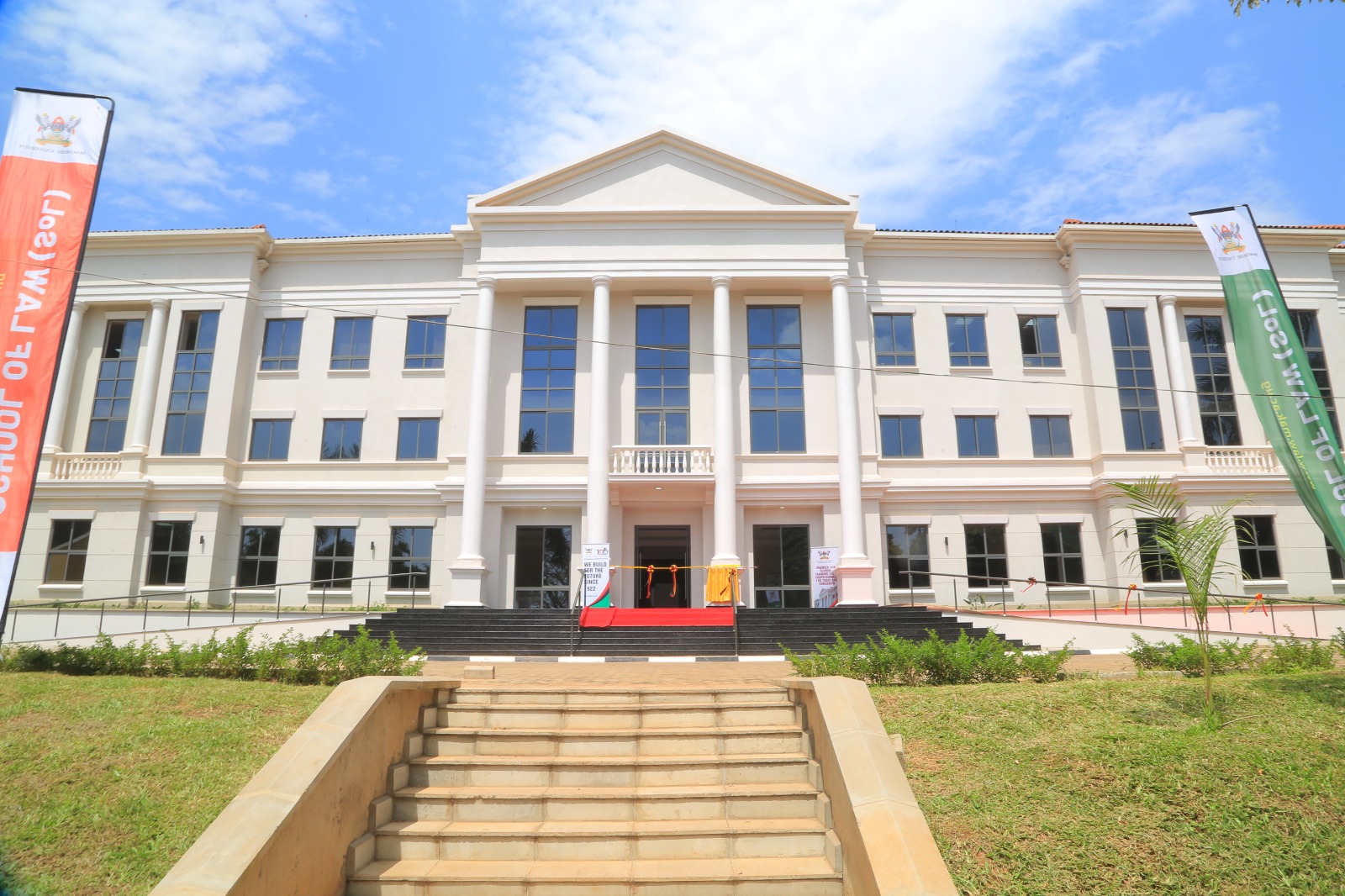
The Management of Makerere University School of Law (SoL) has noted with concern a communication circulating regarding a purported Bachelor of Laws (LLB) programme pre-entry examination coaching and training scheduled to commence on 5th January 2026 at SoL Main Building.
No such training has been approved, sanctioned, or authorized by the School of Law. The SoL does not and will never conduct such trainings. The individuals behind the advert are fraudsters. You contact them at your own risk.
Ronald Naulwairo, PhD
DEAN
Law
Justice Egonda Urges Makerere Scholars to Lead Constitutional Review, develop National Scorecard for Public Office Performance
Published
3 months agoon
November 20, 2025By
Zaam Ssali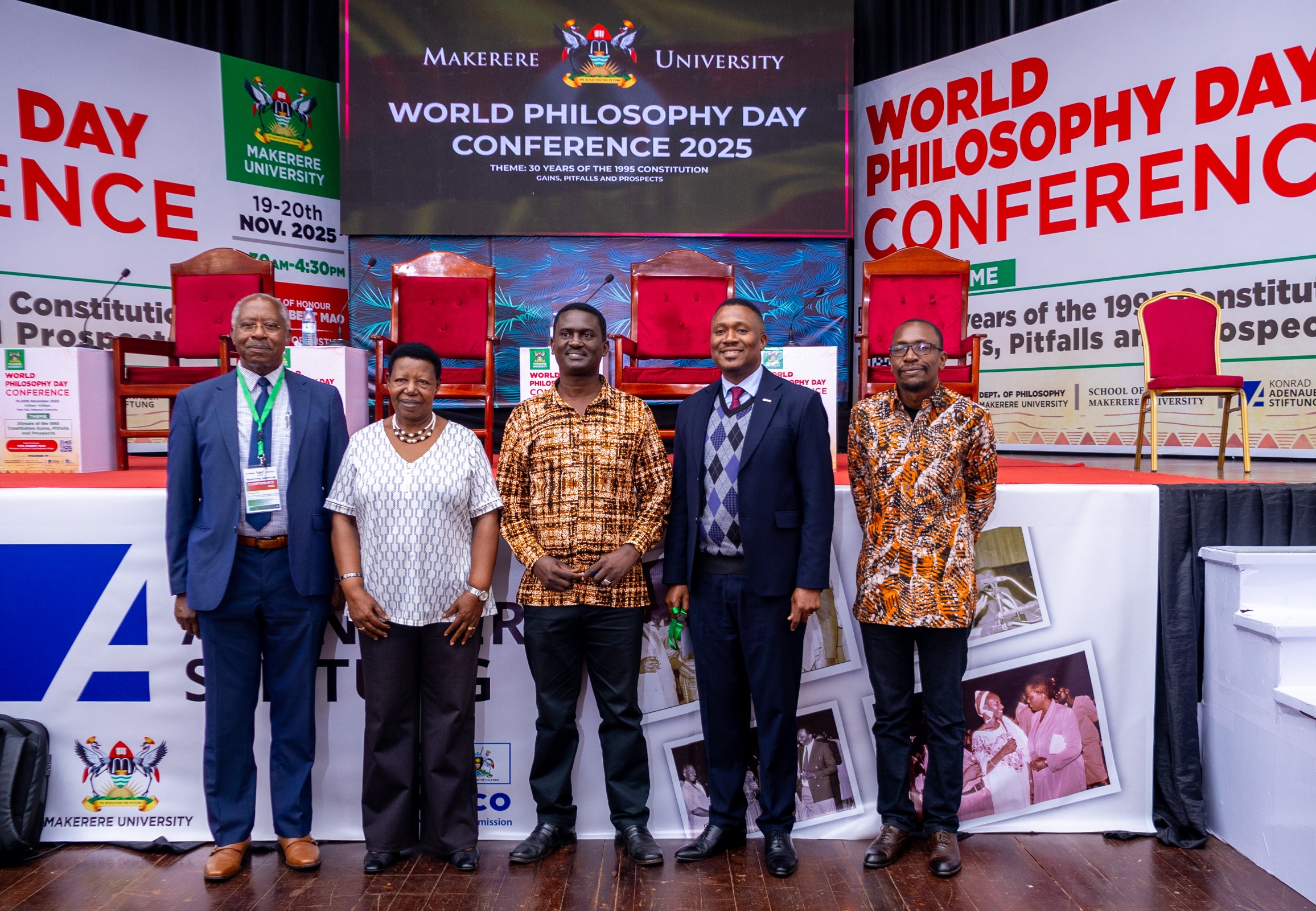
By Zaam Ssali and Jane Anyango
Kampala, Nov. 20, 2025 – Justice Egonda urged Makerere University scholars to spearhead a thorough review of Uganda’s 1995 Constitution and to design a national scoreboard to evaluate constitutional office holders. He said academia—particularly the School of Law—should draft a model constitution to guide national discussions on governance and judicial independence.
Court of Appeal Judge, His Lordship Martin Stephen Egonda made the call delivering a keynote address at a conference to commemorate the World Philosophy Day at Makerere University on 19-20 November 2025.
Justice Egonda warned that Uganda’s constitutional order is deteriorating requiring urgent reforms, urging academia to take lead. He called for two major initiatives: a comprehensive review of the 1995 Constitution and the creation of a national performance scoreboard to evaluate the performance of constitutional officeholders. Egonda argued that universities have the expertise to guide constitutional reform, design a model constitution, and generate independent performance data to strengthen accountability.
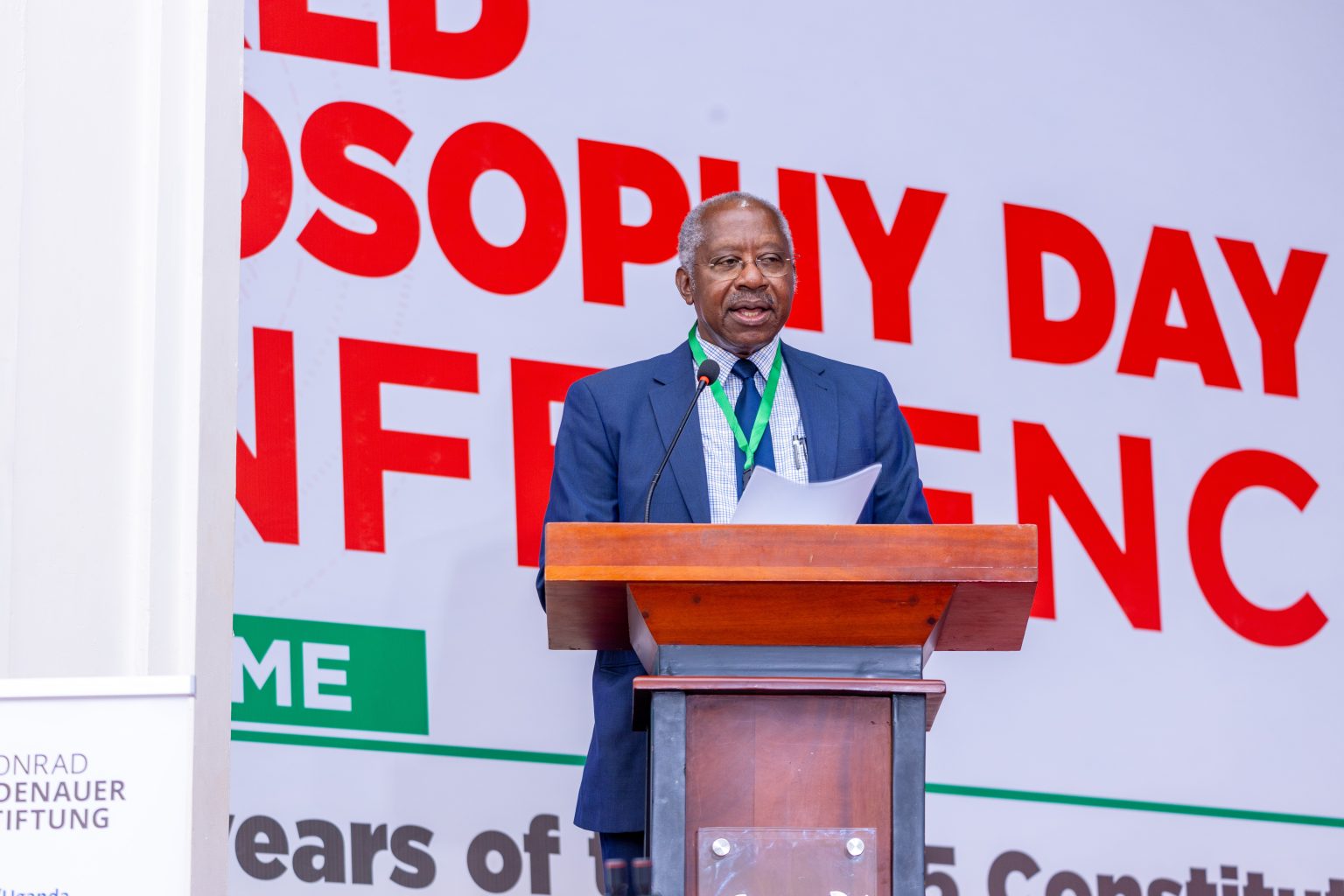
He also called for clear, measurable indicators to assess judges’ and public officials’ performance, noting that current Judiciary reports lack qualitative depth. He advised that Universities can provide independent data and constitution-based metrics. He stressed that such a scoreboard would create awareness about compliance with constitutional obligations, fight abuse of public trust and defend the Constitution by promoting obedience to constitutional mandates. “To sum it up, it would be an act of exacting accountability from holders of constitutional and public offices,” he said.
Justice Egonda cited serious constitutional failures—especially within the Judiciary—highlighting extreme delays in criminal appeals where some inmates completed long sentences before their appeals were heard. He highlighted the systemic dysfunction in case management, unreliable digital judicial systems, leadership vacuums in the Judiciary.
Justice Egonda highlighted a recent judicial review in Kabale, where the Deputy Chief Justice held an open session with stakeholders. A representative from Ndorwa Main Prison reported that 20 inmates had waited months for High Court judgments, with no mechanism to address the delay. Initial checks of the judiciary’s computerized management system showed no pending judgments. However, after updating records following the prison’s submission, officials confirmed the existence of stalled criminal cases and pending judgments, particularly due to transfers of trial judges.
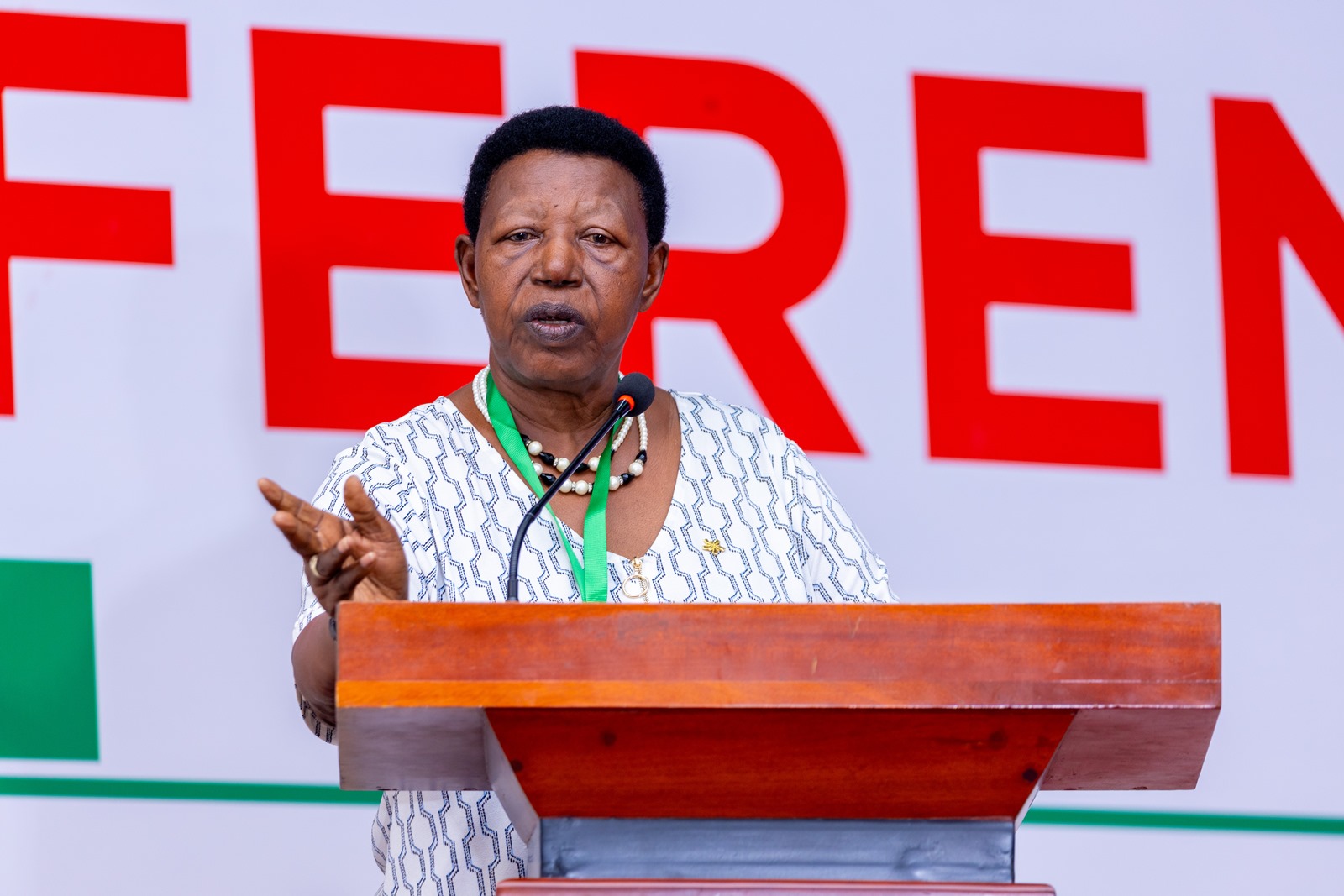
Panelists responded with broader reflections. Dr. Miria Matembe warned that Uganda now has a “constitution without constitutionalism,” arguing that power has been captured and constitutional safeguards eroded, including Parliament’s independence. She urged citizens to reclaim constitutional power, confront corruption, and defend truth even at personal cost.
Professor Chris Mbazira praised Egonda’s condor but emphasized that constitutional reforms alone are inadequate without accompanying political transformation. He said Uganda’s hybrid regime—where informal power overrides formal institutions—must be dismantled for true constitutionalism to take root.
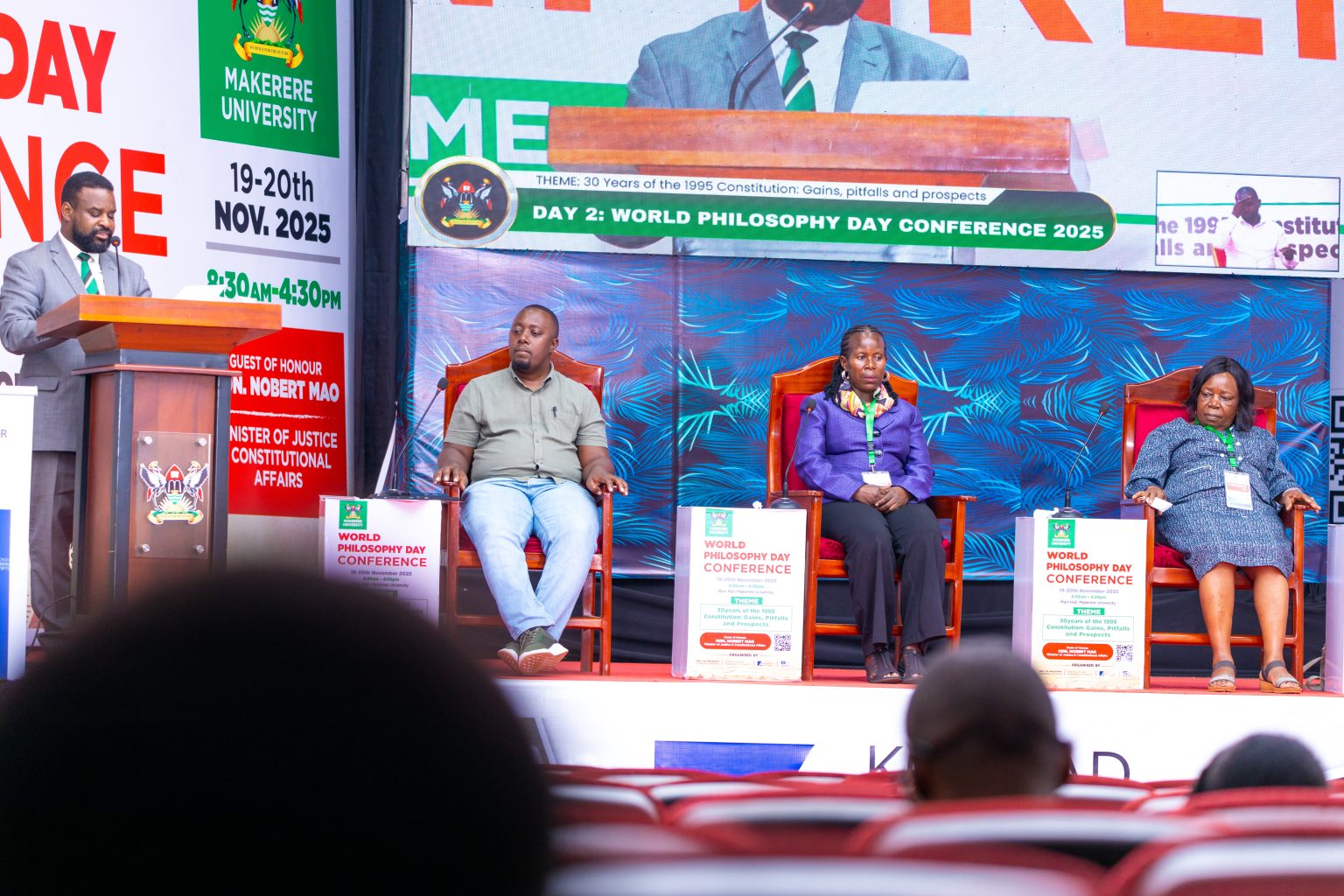
Former Constituent Assembly delegate Hon. Loice Bwambale urged Ugandans, especially youth, to take responsibility for preserving constitutional gains and addressing unresolved issues such as regional representation and land questions. She called for election of principled leaders, civic engagement, and careful review of entrenched constitutional provisions tied to public participation.
Overall, the plenary discussions underscored that restoring constitutionalism in Uganda requires institutional accountability, political reform, citizen activism, and renewed respect for constitutional principles. Specific issues raised during discussion included:
- Accountability necessary for elective positions and offices
- Introduction of term limits for all elective positions
- Ugandans have been conditioned to accept a mediocre leadership model
- The elites including researchers and academia advised to inspire the general population to get involved in constitutionalism
- Sensitization and civic education for members requiring more information. It was noted some
- members have given up hope for any change
- A National dialogue for all Ugandans. The recommendations be cascaded to the population
- and for appreciation by the population who think constitutionalism doesn’t concern them
- Reflect the disintegration of our neighbours like Sudan for lessons to Ugandans
- Commitment by the leaders to hand over power peacefully
- Each of us ask what role everyone can play
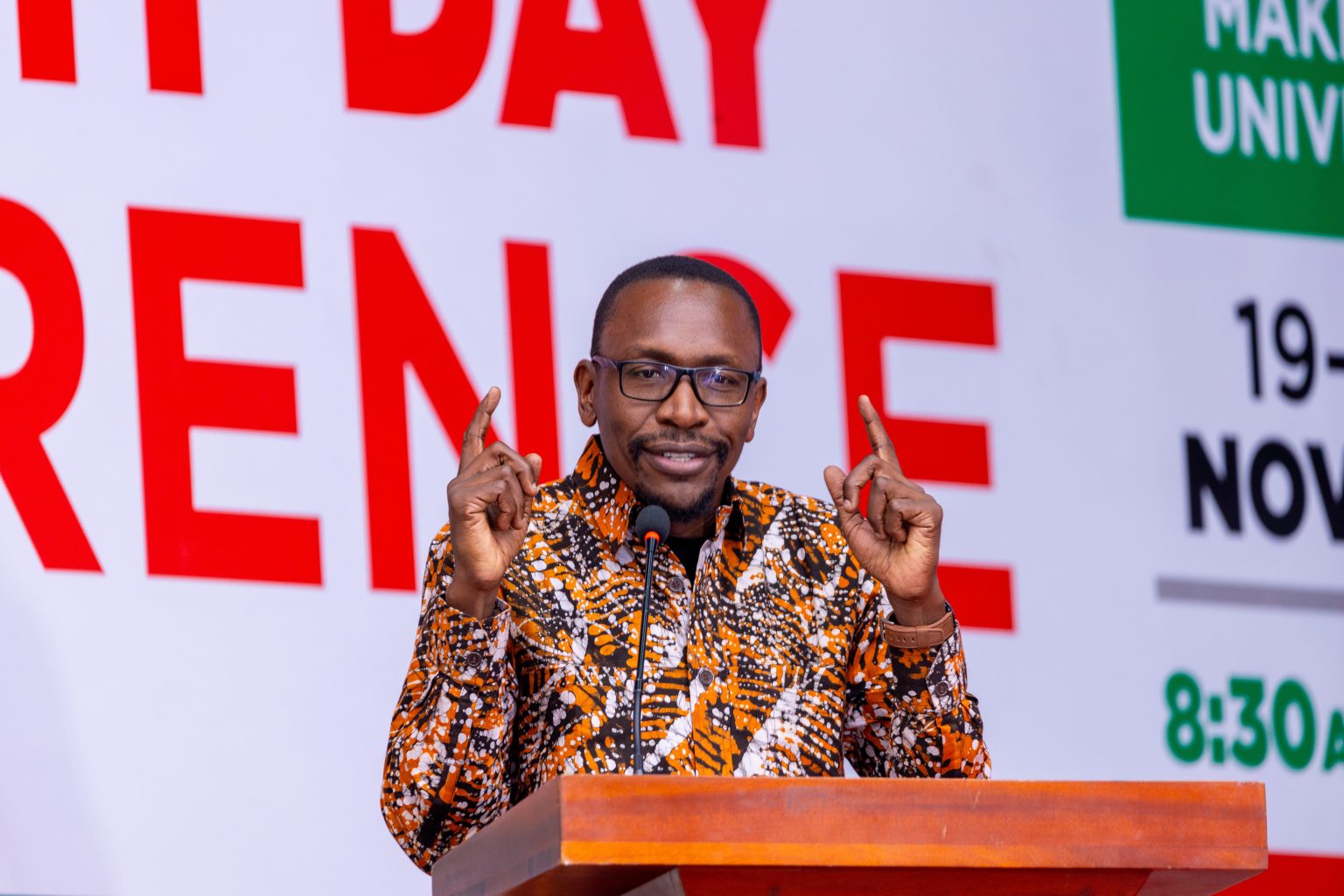
The 2025 World Philosophy Day conference at Makerere University concluded with strong calls for renewed constitutional reflection, ethical leadership, and civic responsibility as Uganda marks 30 years of the 1995 Constitution.
Delivering closing remarks, UNATCOM’ Dr. Pauline Achola, emphasized philosophy’s role in promoting peace, ethical reasoning, and sustainable development. She urged continued examination of the constitution’s gains and gaps and reaffirmed UNESCO’s commitment to
supporting commemoration of the World Philosophy Day dialogue in Uganda.
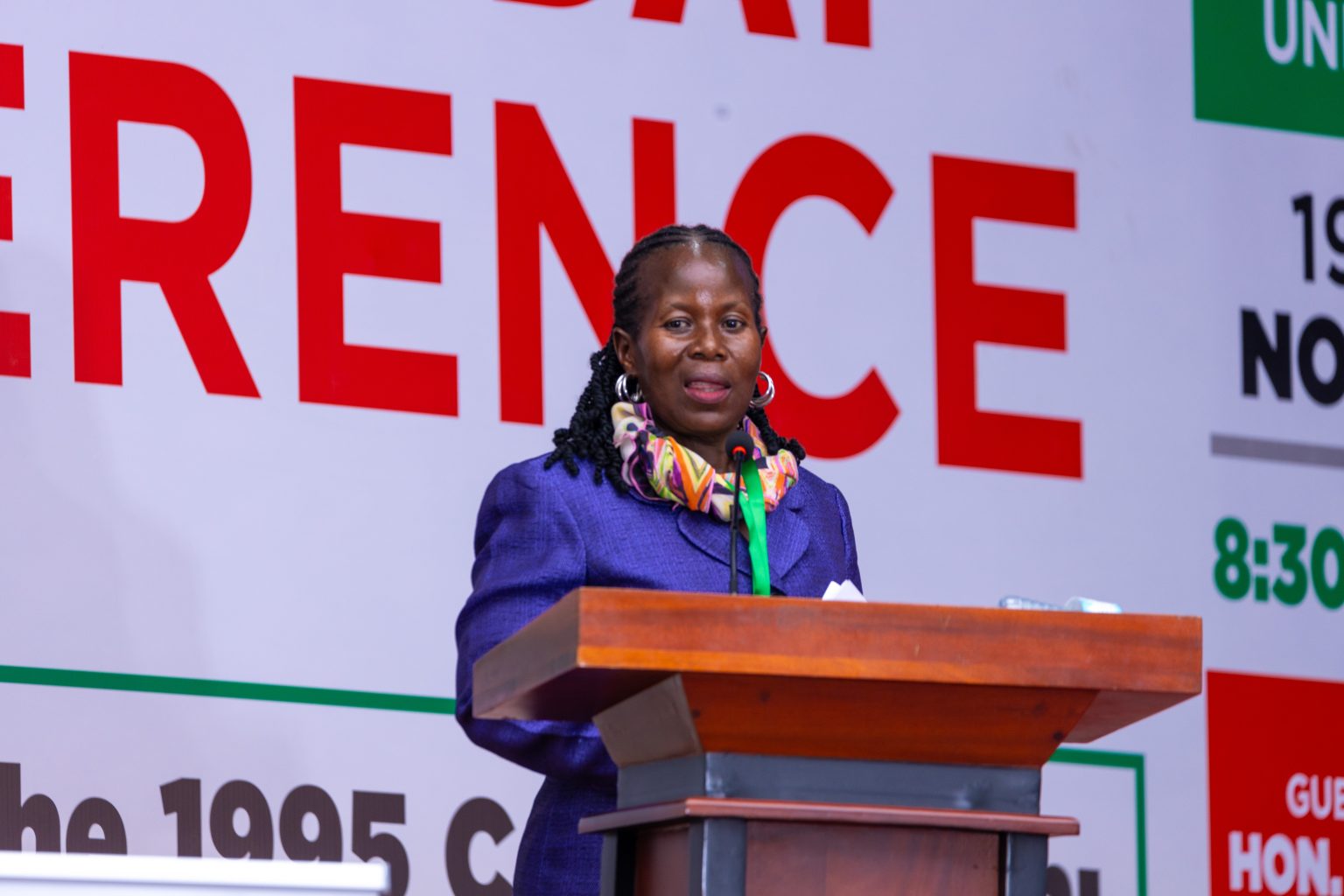
In his speech, Bernard Nkone of Konrad Adenauer Stiftung highlighted major achievements under the 1995 Constitution—human rights, separation of powers, gender equality, and civic participation—while warning that challenges such as corruption, political polarization, and limited access to justice persist. He stressed empowering youth to protect democratic values.
Prof. Robert Wamala – Director Research and Innovations, represented Prof. Sarah Ssali -Deputy Vice Chancellor/Academic Affairs Makerere University. Reading her speech, he underscored philosophy’s importance in fostering ethical leadership and active citizenship. He urged participants to translate conference discussions into policy influence and civic engagement.
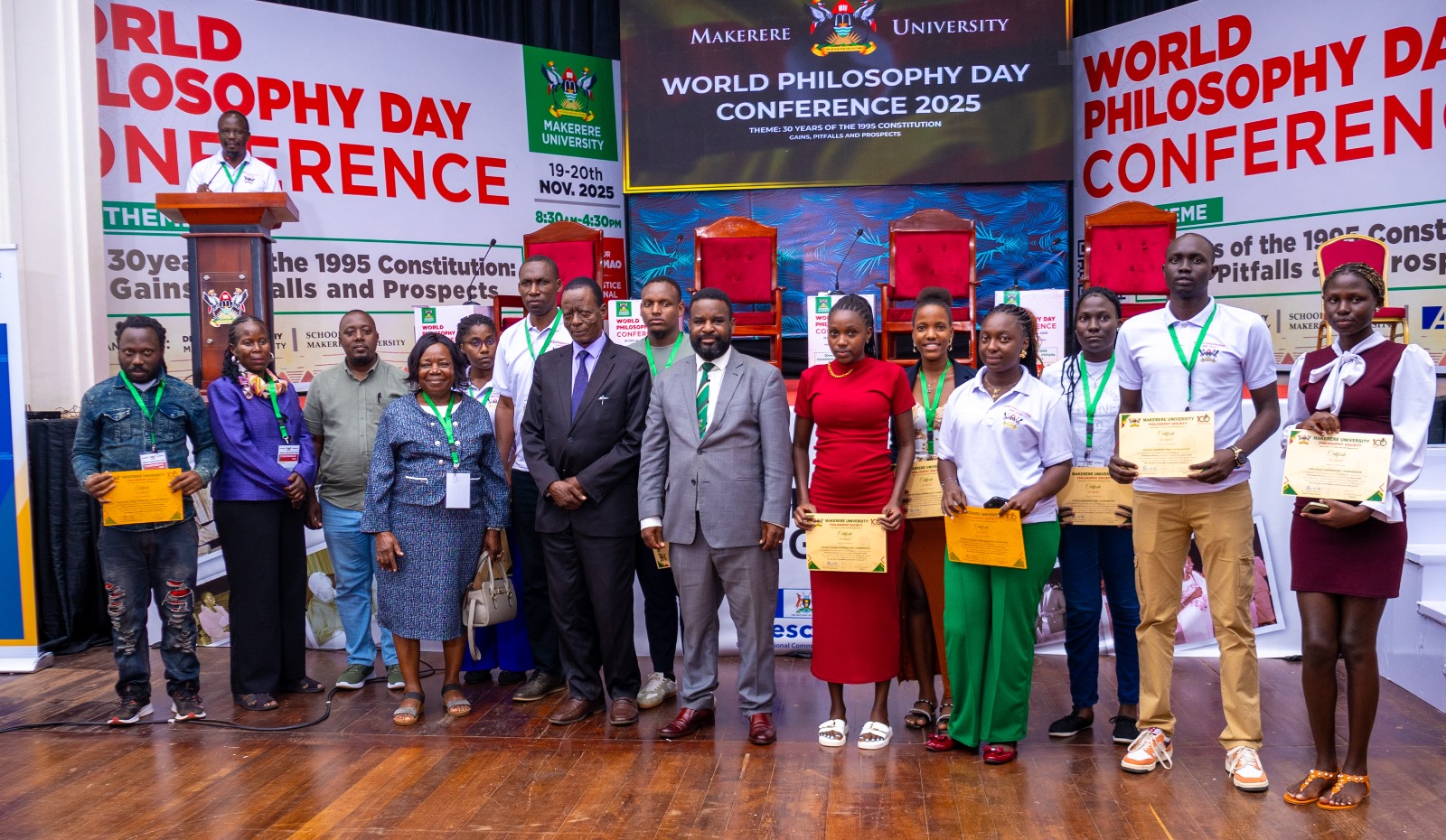
The conference ended with recognition of student representatives from the Makerere University Philosophers’ Society, emphasizing youth contribution in national dialogue.
Zaam Ssali and Jane Anyango are Communication Officers for School of Law & CHUSS respectively.
Law
SoL LLM Orientation 2025: “Keep your Eyes on the Goal” Students Advised
Published
6 months agoon
August 18, 2025By
Zaam Ssali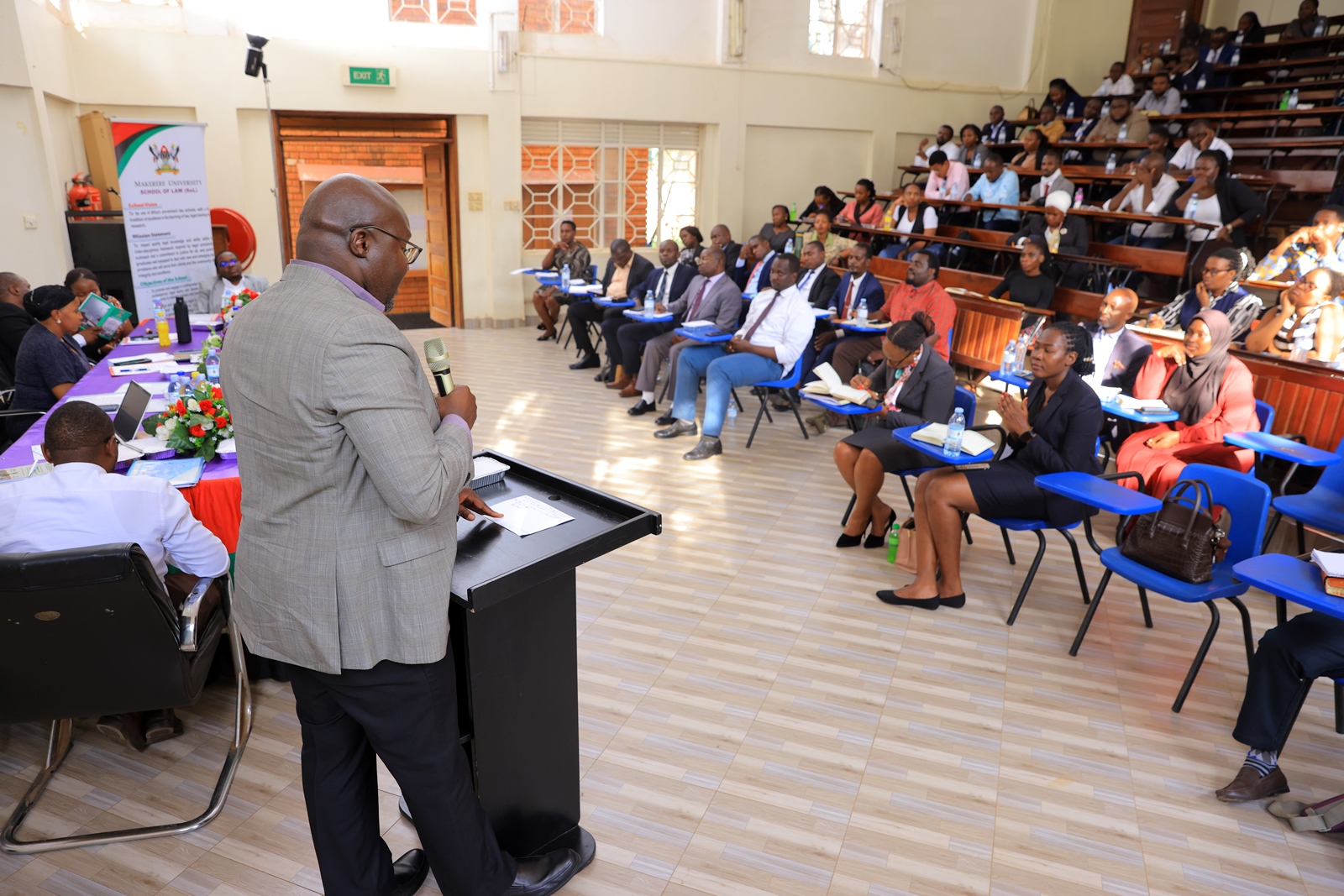
Makerere University School of Law (SoL) held its orientation meeting for the Master of Laws (LLM) 1st year students on the 13th August 2025 in the SoL Auditorium. SoL leadership, Department of Academic Registrar (AR) and Makerere University Directorate of Graduate Training facilitated the meeting.
In his address to the students, Dr. Busingye Kabumba – Head, Human Rights and Peace Centre and SoL Graduate Studies Coordinator welcomed the LLM students to Makerere University and SoL. “I wish to remind you that one plus one equals two, the students must do their bit and we as staff pledge to do our bit. I encourage you to attend classes, handle all assignments on time, and it is my hope that you comply with the University policies”, Dr Busingye Kabumba advised.
He implored the students to hit the ground running and be committed to their studies. “SoL has organised that proposal defence is in year one – semester two so that students have working drafts by year two, this will allow you to finish the programme on time”, he said. Dr. Busingye Kabumba referenced a precedent where a student completed his LLM within one and half years at SoL, which showed that completion in less than two years is possible with commitment.
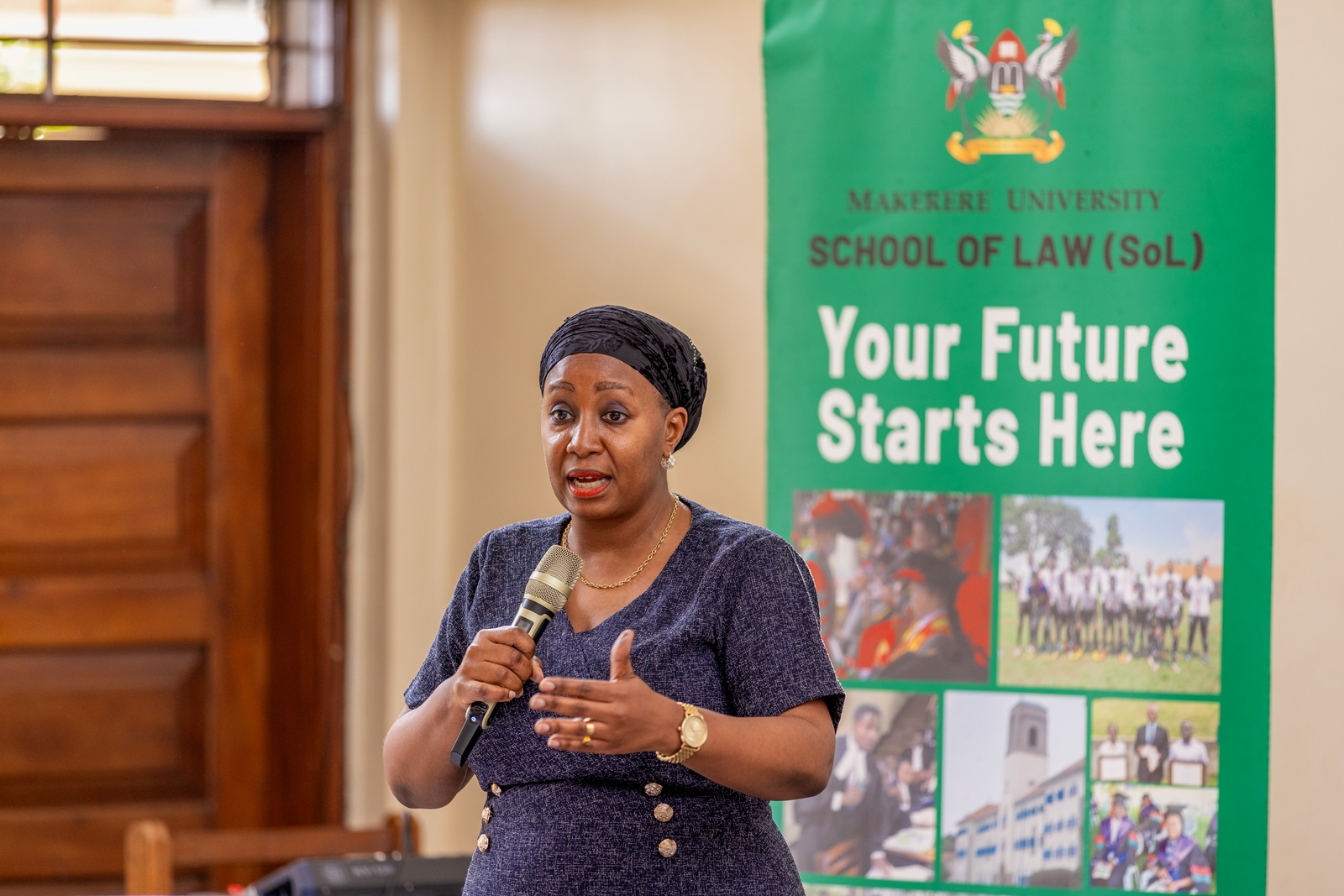
“It is my honour and pleasure to welcome you through the gates of Makerere; I also congratulate you on your admission to LLM, we had so many applicants but we only admitted 124. You don’t choose Makerere but she chooses you. You are lucky to be taught by the legal brains at SoL, all recognized academics in their areas of specialty”, Dr. Zahara Nampewo – Deputy Dean, SoL said in her welcome remarks.
Dr. Nampewo advised the students thus, “This is a 2-year (4 semester) study programme, consider this to be day one of your new story book, you have been admitted in 2025 and it is our hope that you will be graduating in January 2028”.
She further added, “You have your reasons as to why you are enrolling for the LLM and which you wish to fulfill, I therefore take this opportunity to underscore the importance of hard work, determination and resilience. Take the LLM as a full-time engagement, allow us to teach you and help us to help you”.
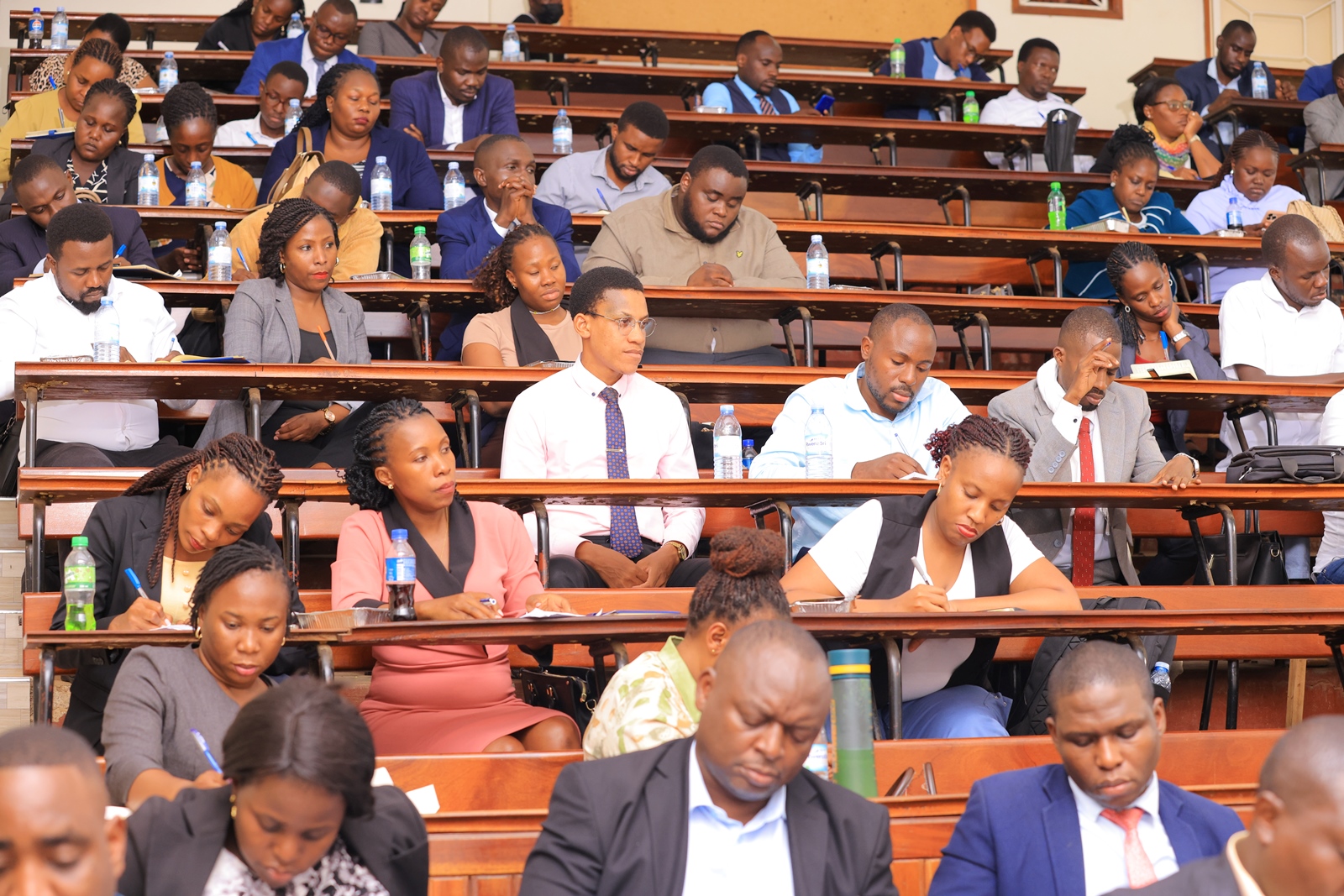
Dr. Nampewo encouraged the students to partake in the various opportunities at SoL besides academics, specifically highlighting the summer schools that students have attended in Europe with support from partners. She also told the students to note that Makerere is a sexual harassment free institution; exclusivity, equal opportunity, gender balance are core values of the University.
Highlighting that SoL has an open-door policy, students were advised to talk to their lecturers for support when challenges arise. “Nothing is insurmountable, every journey starts with a small step”, Dr. Nampewo said.
In his remarks, the Dean-SoL, Assoc. Professor Ronald Naluwairo welcomed the LLM students to Makerere University and congratulated them on the admission to our distinguished LLM programme. He said, “LLM is quiet demanding but doable, a level of commitment and resilience is required. I urge you to attend all your classes”.
Assoc. Professor Naluwairo told the students, regardless of whichever law school you attended for your Bachelor of Laws (LLB), you are now at a Centre of Legal Excellence, work and support one another. “On behalf of SoL, we commit total support to ensure that you succeed in your studies, I also urge you to take responsibility, read and be willing to work”, the Dean advised.
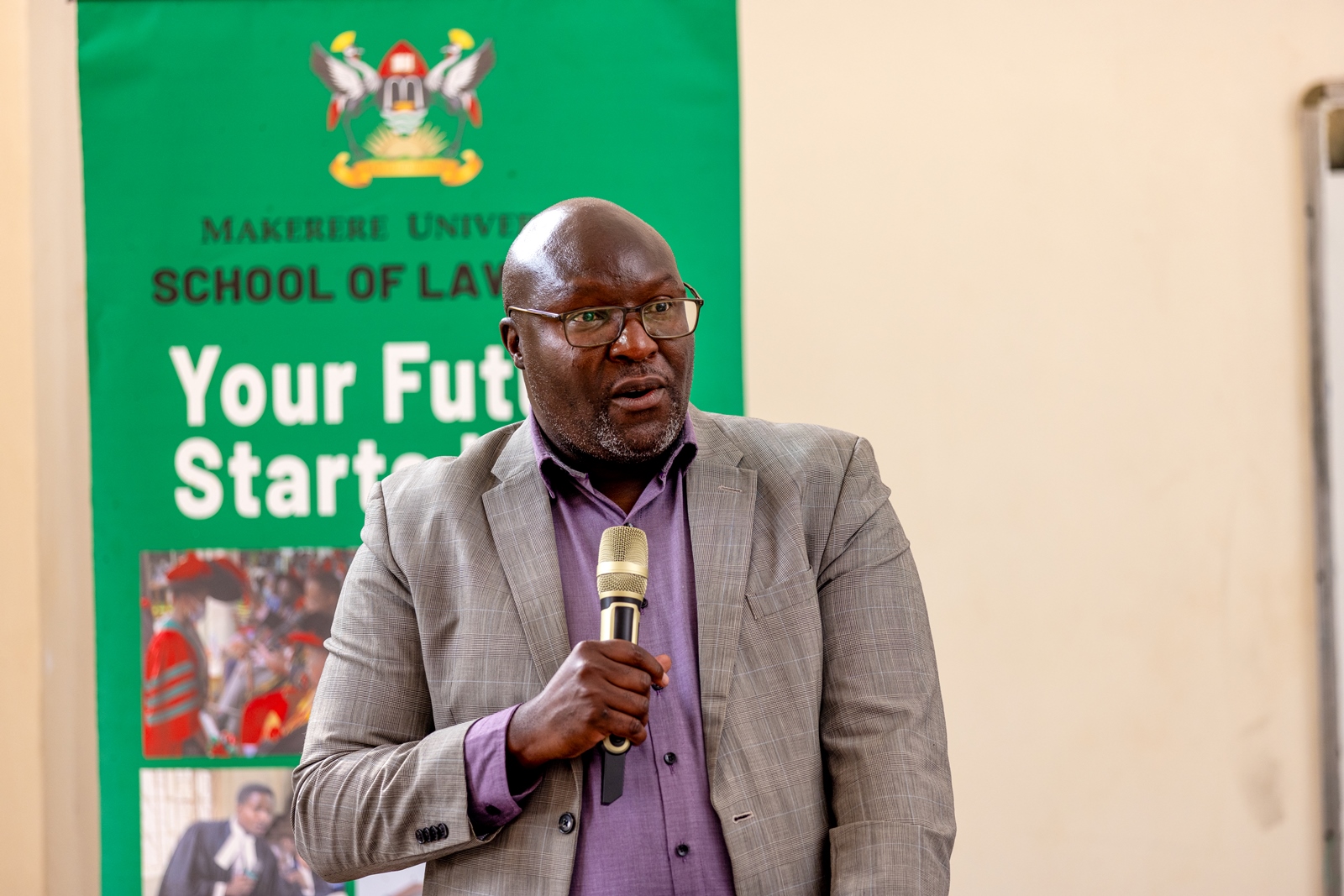
Dr. Mike Barongo, Deputy Registrar in Charge of ICT Division, represented the Academic Registrar’ Department; welcoming the students, he said “this is a great place to be, a premier law school”. He explained to the students what the role of the AR’ Department entails, including application, admission, registration, custody of student records and graduation.
Dr. Barongo highlighted key tasks for new students: activation of students portal, enrolling for recognition as a student, generating payment reference numbers. He advised that where challenges are experienced, the School Registrars are available for support as well as a Support Centre at the College of Computing and Information Sciences (CoCIS) by Makerere University Directorate of ICT.
“Keep your eyes on the goal of why you are here, leave with a master’s degree”, Mr. Laban Lwasa, SoL Registrar told the students. He congratulated them on their excellent performance which earned them a place on the LLM programme. Elucidating the role of the registrar, he said, “We receive you, track your performance, walk with you till graduation and issue your transcript after graduation”. He explained that until they enroll, they aren’t students and they should do so as soon as possible. Mr. Lwasa also clarified the documents required for registration including full admission letter, payment receipts, LLB transcript and certificate, birth certificate and valid ID.
Dr. Dan Ngabirano and Dr. Diana Ahumuza Ateenyi, both faculty at SoL also spoke to the LLM students. They reiterated the message of hard work, commitment, support of others and resilience. They also encouraged the students to understand the elective course-units available to them and the faculty specialisations which will inform their choice of dissertation supervisors.
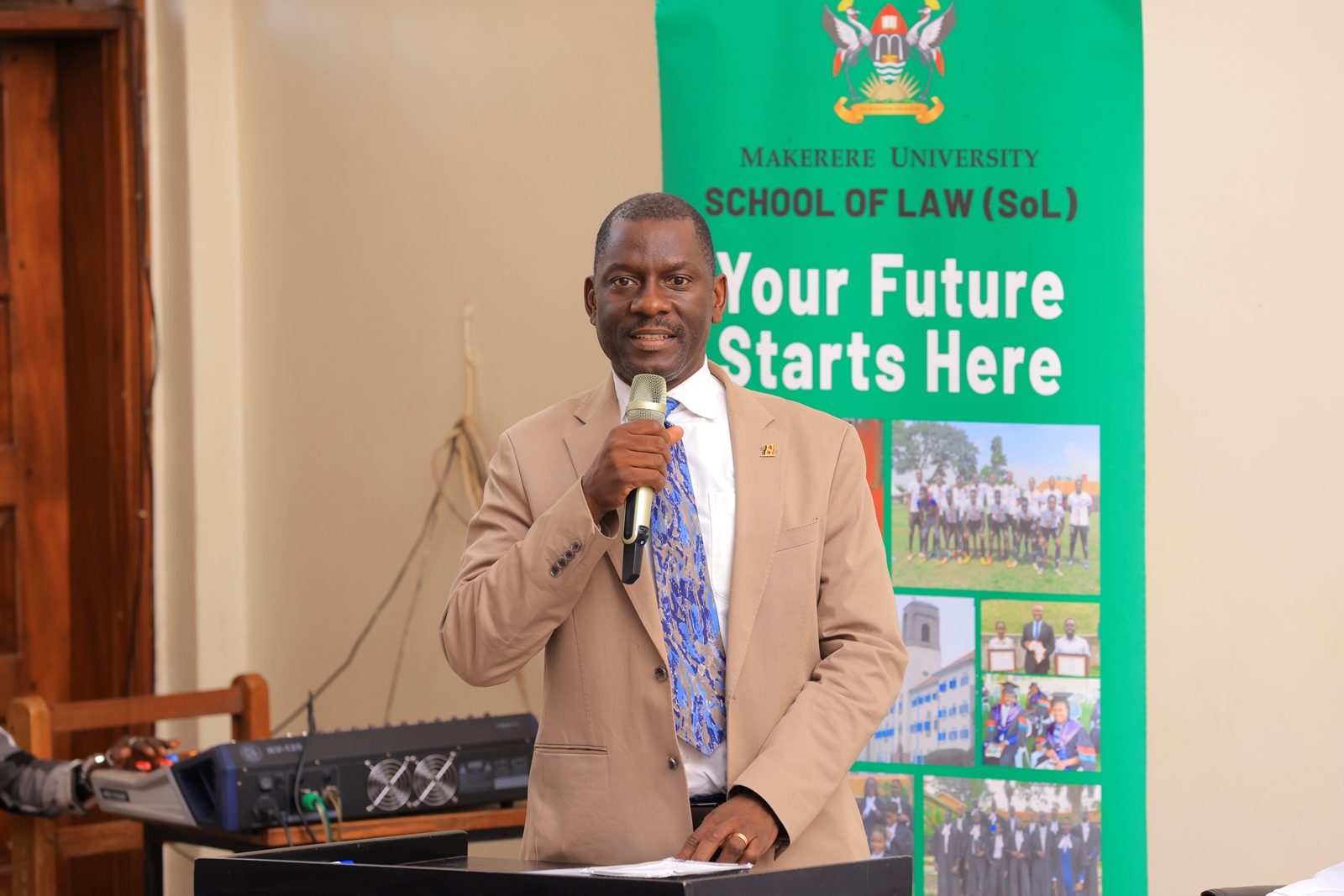
In his address to the students, Assoc. Professor Julius Kikooma, Director-Graduate Training welcomed scholars to Makerere University, a place of knowledge, discovery and transformation. He said, “we are thrilled to have you join our vibrant and dynamic community of scholars at one of Africa’s leading research universities. Your decision to pursue graduate studies here reflects your courage to lead, your passion to learn, and your desire to contribute meaningfully to your field and to society at large”.
Assoc. Professor Kikoma reminded the students that graduate studies are more than a degree, it is a lifeblood of a nation’s vitality and driver of its socio-economic transformation. He added, “graduate research is a strategic national asset, not just about producing knowledge for knowledge’s sake but generating insights, innovations and solutions that: respond to pressing societal challenges and inform evidence-based policy”.
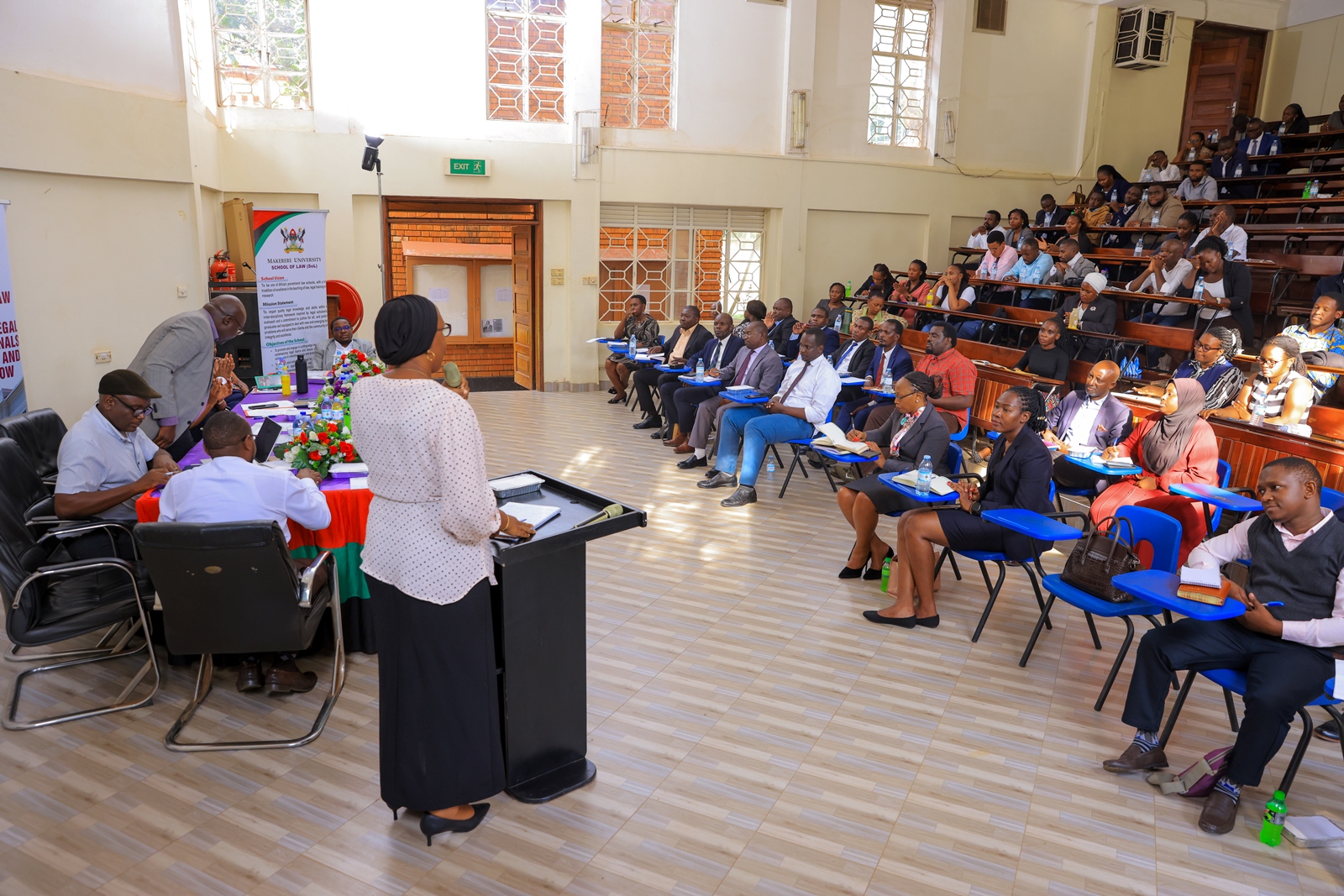
He encouraged the students that as they make choices for their dissertations to select topics that will contribute to Uganda’s Vision 2040 and the forthcoming National Development Plan IV.
A question-and-answer session followed where students sought clarifications on presentations from the various speakers.
Trending
-

 Humanities & Social Sciences3 days ago
Humanities & Social Sciences3 days agoMeet Najjuka Whitney, The Girl Who Missed Law and Found Her Voice
-

 Health1 week ago
Health1 week agoUganda has until 2030 to end Open Defecation as Ntaro’s PhD Examines Kabale’s Progress
-

 Agriculture & Environment6 days ago
Agriculture & Environment6 days agoUganda Martyrs Namugongo Students Turn Organic Waste into Soap in an Innovative School Project on Sustainable Waste Management
-

 General1 week ago
General1 week agoMastercard Foundation Scholars embrace and honour their rich cultural diversity
-

 General3 days ago
General3 days ago76th Graduation Highlights
